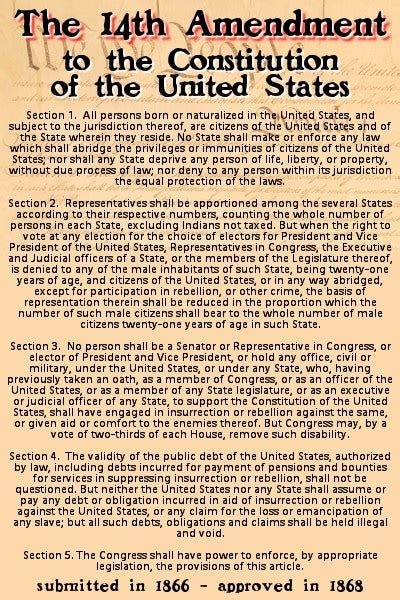The 14th Amendment: The Ideals of American Citizenship, Freedoms, and Protections

The Fourteenth Amendment (1868) to the United States Constitution granted citizenship and equal civil and legal rights to African Americans and enslaved people emancipated after the American Civil War. The amendment included them under the umbrella phrase “all persons born or naturalized in the United States.” This amendment is one of three (13th, 14th, and 15th) passed to address the evils of slavery. The 13th outlawed slavery (except for citizens punished for a crime), and the 15th protected all citizens from racial discrimination in voting. Although we celebrate America’s founding with the Declaration of Independence, the passage of the 14th Amendment birthed the ideals of what America can and should be for all of its citizens.
“No republic is safe that tolerates a privileged class, or denies to any of its citizens’ equal rights and equal means to maintain them.”
-Frederick Douglass
Frederick Douglass and many other abolitionists laid the moral, historical, and political framework for what became known as the “Reconstruction Amendments.” Douglass, former slave, abolitionist, and the most famous African American in the world at the time, spoke passionately about the need for federal laws to address the system of slavery. A civil war would give the nation two options, “national salvation or national ruin.” He compared the crossroads of the U.S. to that of France a few years earlier, (1848) resulting in Louis Philippe’s exile and a new Republic. However, their victory was short-lived due to “politics, perfidy, and the latent forces of despotism.” Douglass’ plea was for the U.S. to not fall into the same trap, relying on “hope and providence” that things would get better in the future. He pressed Lincoln and Congress instead to pass amendments to the Constitution to enshrine the ideals of freedom, liberty, and pursuit of happiness for all citizens, regardless of race, class, or gender. He called for a “National Regeneration” in which the U.S. was a “country which shall not brand the Declaration of Independence as a lie.”
The Fourteenth Amendment to the United States Constitution, adopted on July 9th, 1868, as one of three Reconstruction Amendments, is often considered one of the most consequential amendments. It addressed citizenship rights and equal protection under the law for former slaves following the American Civil War. The amendment was bitterly contested, particularly by the defeated confederacy states, which grudgingly ratified it to regain representation in Congress. John Bingham, the U.S. Representative from Ohio, was predominantly responsible for successfully pushing the amendment through Congress and its eventual ratification.
Former slaves gained equality under this amendment. However, its significance has been distorted and downplayed in the almost 150 years since its ratification. The reasons behind the 14th Amendment’s obscurity are due to its success and later destruction at the hands of several former confederate states and disastrous rulings by the Supreme Court. Following the passage of the 13th, 14th, and 15th Amendments, and the Civil Rights Act of 1875, African Americans flourished in a period known as Reconstruction. Black communities and “Black Wall Streets” thrived in this period. Black politicians sought and won public office at the local, state, and federal levels. The first African American U.S. Senator, Hiram Revels, served from 1869–1873. This progress was both remarkable and, unfortunately, short-lived. The Supreme Court ruled the Civil Rights Act of 1875 unconstitutional in 1883. The court also said, “Congress lacked the constitutional authority under the 14th Amendment to grant equal protection under the law to Blacks, stating that only states and local governments could do that.” It also passed a ruling stating that the Enforcement Act of 1871, which forbade Ku Klux Klan members’ meetings, was unconstitutional. These rulings suppressed the civil rights movement in the latter half of the 19th century. The outcomes of these cases also helped to usher in “a period of de jure racial discrimination that would last almost a century and was virtually as odious as slavery itself.”
The 14th Amendment saw a resurgence over the last 60 years, with landmark cases and legislation such as Brown v. Board of Education, The Civil Rights Act of 1964, Loving v. Virginia, Reed v. Reed, Roe v. Wade, and Obergefell v. Hodges. These cases enshrined the freedoms and protections for all Americans. Most of what we are proudest of as Americans, and in many ways, what makes us free, is embedded in the 14th Amendment. As one politician described it at the time, “This amendment was born in battle, forged in controversy, and ratified amid rancor.”
“Injustice anywhere is a threat to justice everywhere. We are caught in an inescapable network of mutuality, tied in a single garment of destiny. Whatever affects one directly affects all indirectly.”
-Dr. Martin Luther King, Jr.
At Pariveda, our Findamentals encourage us to treat everyone with respect, empower and enable others, and support and care for the whole person. We cannot rest on our laurels and assume the future will always be better than the past. We must continue to protect the hard-fought freedoms and protections in our Constitution, Amendments, and laws. We must also defend these freedoms from those who wish to turn back the hands of time to darker times in our history. No protection or liberty is ever guaranteed.
Daniel is a principal with Pariveda Solutions, specializing in digital strategy, automation, and analytics. He has helped clients across the public and private sectors achieve strategic and technology goals. With B.S. and M.S. degrees in Computer Science and Technology Management respectively, he has become an expert in digital transformation and data strategy. Daniel is also co-founder of TEN X Lab, an accelerator investing in the growth of black-owned businesses by 10X over the next ten years.
